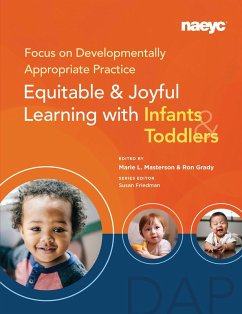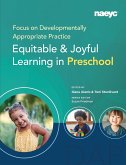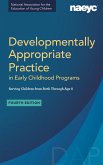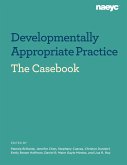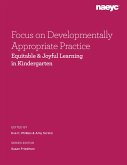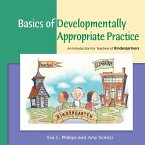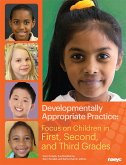Focus on Developmentally Appropriate Practice
Equitable and Joyful Learning with Infants and Toddlers
Herausgeber: Masterson, Marie L; Grady, Ron
Focus on Developmentally Appropriate Practice
Equitable and Joyful Learning with Infants and Toddlers
Herausgeber: Masterson, Marie L; Grady, Ron
- Broschiertes Buch
- Merkliste
- Auf die Merkliste
- Bewerten Bewerten
- Teilen
- Produkt teilen
- Produkterinnerung
- Produkterinnerung
What Does Developmentally Appropriate Practice Look Like in an Infant and Toddler Program? If you’ve ever wondered how effective teachers actually do DAP with very young children, this is the book for you. Here, you can peek into classrooms to see teachers making intentional decisions in key areas of practice. These areas form the six guidelines for DAP in action: 1. Building a community where everyone is welcomed and supported to grow 2. Facilitating reciprocal partnerships with families 3. Observing, assessing, and documenting children’s development and learning 4. Using teaching strategies…mehr
Andere Kunden interessierten sich auch für
![Focus on Developmentally Appropriate Practice Focus on Developmentally Appropriate Practice]() Focus on Developmentally Appropriate Practice35,99 €
Focus on Developmentally Appropriate Practice35,99 €![Developmentally Appropriate Practice in Early Childhood Programs Serving Children from Birth Through Age 8, Fourth Edition (Fully Revised and Updated) Developmentally Appropriate Practice in Early Childhood Programs Serving Children from Birth Through Age 8, Fourth Edition (Fully Revised and Updated)]() NaeycDevelopmentally Appropriate Practice in Early Childhood Programs Serving Children from Birth Through Age 8, Fourth Edition (Fully Revised and Updated)69,99 €
NaeycDevelopmentally Appropriate Practice in Early Childhood Programs Serving Children from Birth Through Age 8, Fourth Edition (Fully Revised and Updated)69,99 €![Casebook: Developmentally Appropriate Practice in Early Childhood Programs Serving Children from Birth Through Age 8 Casebook: Developmentally Appropriate Practice in Early Childhood Programs Serving Children from Birth Through Age 8]() Casebook: Developmentally Appropriate Practice in Early Childhood Programs Serving Children from Birth Through Age 842,99 €
Casebook: Developmentally Appropriate Practice in Early Childhood Programs Serving Children from Birth Through Age 842,99 €![Focus on Developmentally Appropriate Practice Focus on Developmentally Appropriate Practice]() Focus on Developmentally Appropriate Practice32,99 €
Focus on Developmentally Appropriate Practice32,99 €![Basics of Developmentally Appropriate Practice Basics of Developmentally Appropriate Practice]() Eva C. PhillipsBasics of Developmentally Appropriate Practice23,99 €
Eva C. PhillipsBasics of Developmentally Appropriate Practice23,99 €![Assessment of Young Children Assessment of Young Children]() Lisa B. Fiore (USA Lesley University)Assessment of Young Children60,99 €
Lisa B. Fiore (USA Lesley University)Assessment of Young Children60,99 €![Developmentally Appropriate Practice Developmentally Appropriate Practice]() Sue BredekampDevelopmentally Appropriate Practice53,99 €
Sue BredekampDevelopmentally Appropriate Practice53,99 €-
-
-
What Does Developmentally Appropriate Practice Look Like in an Infant and Toddler Program? If you’ve ever wondered how effective teachers actually do DAP with very young children, this is the book for you. Here, you can peek into classrooms to see teachers making intentional decisions in key areas of practice. These areas form the six guidelines for DAP in action: 1. Building a community where everyone is welcomed and supported to grow 2. Facilitating reciprocal partnerships with families 3. Observing, assessing, and documenting children’s development and learning 4. Using teaching strategies that enhance learning for each child 5. Implementing curriculum tied to meaningful learning goals 6. Demonstrating professionalism You’ll discover * More about what each guideline means for working with infants and toddlers and their families * Chapters that showcase articles from Young Children and NAEYC book excerpts—plus brand-new content—illustrating excellent teaching strategies related to each guideline * Examples you can model, adapt, and implement in your own practice Enrich and deepen your teaching, and enable children’s learning to flourish!
Hinweis: Dieser Artikel kann nur an eine deutsche Lieferadresse ausgeliefert werden.
Hinweis: Dieser Artikel kann nur an eine deutsche Lieferadresse ausgeliefert werden.
Produktdetails
- Produktdetails
- Verlag: National Association for the Education of Young Children
- Seitenzahl: 144
- Erscheinungstermin: 10. September 2024
- Englisch
- Abmessung: 274mm x 211mm x 15mm
- Gewicht: 334g
- ISBN-13: 9781952331282
- ISBN-10: 1952331285
- Artikelnr.: 69924421
- Herstellerkennzeichnung
- Libri GmbH
- Europaallee 1
- 36244 Bad Hersfeld
- gpsr@libri.de
- Verlag: National Association for the Education of Young Children
- Seitenzahl: 144
- Erscheinungstermin: 10. September 2024
- Englisch
- Abmessung: 274mm x 211mm x 15mm
- Gewicht: 334g
- ISBN-13: 9781952331282
- ISBN-10: 1952331285
- Artikelnr.: 69924421
- Herstellerkennzeichnung
- Libri GmbH
- Europaallee 1
- 36244 Bad Hersfeld
- gpsr@libri.de
Volume editors Marie L. Masterson, PhD, is the director of quality assessment at the McCormick Center for Early Childhood Leadership at National Louis University, where she oversees evaluation for Illinois ExceleRate. She holds a doctorate in early childhood education, is a licensed teacher, and is a national speaker and author of many books and articles that address research-based, practical skills for high-quality teaching, behavior guidance, quality improvement, and leadership. She is a contributing editor of Developmentally Appropriate Practice in Early Childhood Programs Serving Children from Birth Through Age Eight, Fourth Edition, and coauthor of Building on Whole Leadership: Energizing and Strengthening Your Early Childhood Program. Dr. Masterson is a former higher education faculty teacher trainer and early childhood specialist for the Virginia Department of Education. She provides educational consulting and professional development training to child care programs, schools, and organizations engaged in quality improvement and equitable teaching initiatives. Ron Grady, MSEd, engages in work centered on the social worlds and peer cultures of young children, wondering how lived experience is both constructed within and revealed throughout play, the creation of art and narrative, and visual media such as photography and film. He taught preschool at NOLA Nature School in New Orleans for many years. Ron is a doctoral student in education at the Harvard Graduate School of Education and holds a master’s degree in early childhood education from the Erikson Institute. He is the author of Honoring the Moment in Young Children’s Lives: Observation, Documentation, and Reflection(Redleaf Press) and many articles on early childhood topics. He is also the author and illustrator of the children’s book What Does Brown Mean to You? Ron serves on the editorial boards of both the Harvard Educational Review and Voices of Practitioners. Series editor Susan Friedman is senior director of publishing and content development at NAEYC. In this role, she leads the content development work of NAEYC’s books and periodicals teams. Ms. Friedman is coeditor of Each and Every Child: Teaching Preschool with an Equity Lens. She has extensive prior experience creating content on play, developmentally appropriate uses of media, and other topics for educators and families. She has presented at numerous educational conferences, including NAEYC’s Professional Learning Institute and Annual Conference, the South by Southwest Education (SXSW EDU) Conference & Festival, and the School Superintendents Association’s Early Learning Cohort. She began her career as a preschool teacher at City and Country School in New York City. She holds degrees from Vassar College and the Harvard Graduate School of Education.
1. About the Editors
2. Focus on Developmentally Appropriate Practice: Equitable and Joyful
Learning Book Series
3. Developmentally Appropriate Practice: An Introduction
4. Developmentally Appropriate Practice with Infants and Toddlers
5. Part 1: Creating a Caring, Equitable Community of Learners
* Chapter 1: Caring Relationships: The Heart of Early Brain Development
J. Ronald Lally and Peter L. Mangione
* Chapter 2: Care and Equity in Toddler Classrooms: Practices for
Creating, Sustaining, and Empowering Community Nana E.
Appiah-Korang and Abigail P. Gulden
* Chapter 3: Cultivating Positive Relationships and Physical
Environments to Support Emotional Well-Being Iheoma U. Iruka
* Chapter 4: The First Step for Addressing Bias in Infant and Toddler
Programs Sarah MacLaughlin
6. Part 2: Engaging in Reciprocal Partnerships with Families and Fostering
Community Connections
* Chapter 5: Creating Partnerships to Support Families of Infants and
Toddlers Kelly Ramsey
* Chapter 6: Engaging with Families to Individualize Teaching Marie
L. Masterson
* Chapter 7: Facilitating a Child’s Transition from Home to Program
Through the Use of Cultural Caring Routines Josephine Ahmadein
* Chapter 8: Speaking Out: Supporting Families in Advocacy Kristen
Johnson and Amanda Perez
7. Part 3: Observing, Documenting, and Assessing Children’s Development and
Learning
* Chapter 9: Bringing Observation and Documentation to Life in Infant
and Toddler Settings Rebecca Parlakian
* Chapter 10: Observation and Documentation: Both Art and Science
Malori‑Naomi Wallace‑Wyche
* Chapter 11: Using a Child-Centered Approach to Shift from a Deficit
Mindset Julia Luckenbill, Aarti Subramaniam, and Janet Thompson
* Chapter 12: Empowering Infants’ and Toddlers’ Learning Through
Scaffolding Linda Groves Gillespie and Jan D. Greenberg
* Chapter 13: What Babies Ask of Us: Contexts to Support Learning About
Self and Other Mary Jane Maguire-Fong
8. Part 4: Teaching to Enhance Each Child’s Development and Learning
* Chapter 14: What to Teach Before Talking: Developing Communication
Skills Across Home and Early Learning Contexts Mollie Romano,
Jennifer A. Brown, Christan Coogle, Jennifer R. Ottley, and Emily M.
Rose
* Chapter 15: The Power of Pause: Moments of Silence and Early
Emotional and Language Development Nodelyn Abayan
* Chapter 16: Strengthening Infant and Toddler Teaching with Explicit
Language Skills Allyson Dean and Linda Groves Gillespie
* Chapter 17: “You’re Okay” May Not Be Okay: Using Emotion Language to
Promote Toddlers’ Social and Emotional Development Elizabeth K.
King
* Chapter 18: We Put Paper on the Floor: Supporting the Emergent
Literacy Skills of Infants and Toddlers Dilshad Tolliver
9. Part 5: Planning and Implementing an Engaging Curriculum to Achieve
Meaningful Goals
* Chapter 19: Curriculum Considerations for Multilingual Infants and
Toddlers Irasema Salinas-González, Iliana Alanís, and María G.
Arreguín
* Chapter 20: When in Doubt, Reach Out: Teaming Strategies for
Inclusive Settings Christine M. Spence, Deserai Miller, Catherine
Corr, Rosa Milagros Santos, and Brandie Bentley
* Chapter 21: Exploring Outdoors: First Learning Experiences in Nature
Mary Benson McMullen and Dylan Brody
* Chapter 22: Using the Environment and Materials as Curriculum for
Promoting Exploration of Cause and Effect Guadalupe Rivas Jer
* Chapter 23: Infant and Toddler STEAM: Supporting Interdisciplinary
Experiences with Our Youngest Learners Eric Bucher and Stephanie
Pindra
10. Part 6: Demonstrating Professionalism as an Early Childhood Educator
* Chapter 24: Nurturing Your Professional Appetite: Preparing Your
Professional Development Path Christy Brown‑John
* Chapter 25: Creating Learning Stories in the Context of Inquiry
Groups Isauro M. Escamilla, Linda R. Kroll, Daniel R. Meier, and
Annie White
* Chapter 26: Thinking of Yourself as a Professional Nicole Lazarte
* Chapter 27: Advocacy in Action: Stepping Up to Make an Impact Maria
Estlund
11. Index
2. Focus on Developmentally Appropriate Practice: Equitable and Joyful
Learning Book Series
3. Developmentally Appropriate Practice: An Introduction
4. Developmentally Appropriate Practice with Infants and Toddlers
5. Part 1: Creating a Caring, Equitable Community of Learners
* Chapter 1: Caring Relationships: The Heart of Early Brain Development
J. Ronald Lally and Peter L. Mangione
* Chapter 2: Care and Equity in Toddler Classrooms: Practices for
Creating, Sustaining, and Empowering Community Nana E.
Appiah-Korang and Abigail P. Gulden
* Chapter 3: Cultivating Positive Relationships and Physical
Environments to Support Emotional Well-Being Iheoma U. Iruka
* Chapter 4: The First Step for Addressing Bias in Infant and Toddler
Programs Sarah MacLaughlin
6. Part 2: Engaging in Reciprocal Partnerships with Families and Fostering
Community Connections
* Chapter 5: Creating Partnerships to Support Families of Infants and
Toddlers Kelly Ramsey
* Chapter 6: Engaging with Families to Individualize Teaching Marie
L. Masterson
* Chapter 7: Facilitating a Child’s Transition from Home to Program
Through the Use of Cultural Caring Routines Josephine Ahmadein
* Chapter 8: Speaking Out: Supporting Families in Advocacy Kristen
Johnson and Amanda Perez
7. Part 3: Observing, Documenting, and Assessing Children’s Development and
Learning
* Chapter 9: Bringing Observation and Documentation to Life in Infant
and Toddler Settings Rebecca Parlakian
* Chapter 10: Observation and Documentation: Both Art and Science
Malori‑Naomi Wallace‑Wyche
* Chapter 11: Using a Child-Centered Approach to Shift from a Deficit
Mindset Julia Luckenbill, Aarti Subramaniam, and Janet Thompson
* Chapter 12: Empowering Infants’ and Toddlers’ Learning Through
Scaffolding Linda Groves Gillespie and Jan D. Greenberg
* Chapter 13: What Babies Ask of Us: Contexts to Support Learning About
Self and Other Mary Jane Maguire-Fong
8. Part 4: Teaching to Enhance Each Child’s Development and Learning
* Chapter 14: What to Teach Before Talking: Developing Communication
Skills Across Home and Early Learning Contexts Mollie Romano,
Jennifer A. Brown, Christan Coogle, Jennifer R. Ottley, and Emily M.
Rose
* Chapter 15: The Power of Pause: Moments of Silence and Early
Emotional and Language Development Nodelyn Abayan
* Chapter 16: Strengthening Infant and Toddler Teaching with Explicit
Language Skills Allyson Dean and Linda Groves Gillespie
* Chapter 17: “You’re Okay” May Not Be Okay: Using Emotion Language to
Promote Toddlers’ Social and Emotional Development Elizabeth K.
King
* Chapter 18: We Put Paper on the Floor: Supporting the Emergent
Literacy Skills of Infants and Toddlers Dilshad Tolliver
9. Part 5: Planning and Implementing an Engaging Curriculum to Achieve
Meaningful Goals
* Chapter 19: Curriculum Considerations for Multilingual Infants and
Toddlers Irasema Salinas-González, Iliana Alanís, and María G.
Arreguín
* Chapter 20: When in Doubt, Reach Out: Teaming Strategies for
Inclusive Settings Christine M. Spence, Deserai Miller, Catherine
Corr, Rosa Milagros Santos, and Brandie Bentley
* Chapter 21: Exploring Outdoors: First Learning Experiences in Nature
Mary Benson McMullen and Dylan Brody
* Chapter 22: Using the Environment and Materials as Curriculum for
Promoting Exploration of Cause and Effect Guadalupe Rivas Jer
* Chapter 23: Infant and Toddler STEAM: Supporting Interdisciplinary
Experiences with Our Youngest Learners Eric Bucher and Stephanie
Pindra
10. Part 6: Demonstrating Professionalism as an Early Childhood Educator
* Chapter 24: Nurturing Your Professional Appetite: Preparing Your
Professional Development Path Christy Brown‑John
* Chapter 25: Creating Learning Stories in the Context of Inquiry
Groups Isauro M. Escamilla, Linda R. Kroll, Daniel R. Meier, and
Annie White
* Chapter 26: Thinking of Yourself as a Professional Nicole Lazarte
* Chapter 27: Advocacy in Action: Stepping Up to Make an Impact Maria
Estlund
11. Index
1. About the Editors
2. Focus on Developmentally Appropriate Practice: Equitable and Joyful
Learning Book Series
3. Developmentally Appropriate Practice: An Introduction
4. Developmentally Appropriate Practice with Infants and Toddlers
5. Part 1: Creating a Caring, Equitable Community of Learners
* Chapter 1: Caring Relationships: The Heart of Early Brain Development
J. Ronald Lally and Peter L. Mangione
* Chapter 2: Care and Equity in Toddler Classrooms: Practices for
Creating, Sustaining, and Empowering Community Nana E.
Appiah-Korang and Abigail P. Gulden
* Chapter 3: Cultivating Positive Relationships and Physical
Environments to Support Emotional Well-Being Iheoma U. Iruka
* Chapter 4: The First Step for Addressing Bias in Infant and Toddler
Programs Sarah MacLaughlin
6. Part 2: Engaging in Reciprocal Partnerships with Families and Fostering
Community Connections
* Chapter 5: Creating Partnerships to Support Families of Infants and
Toddlers Kelly Ramsey
* Chapter 6: Engaging with Families to Individualize Teaching Marie
L. Masterson
* Chapter 7: Facilitating a Child’s Transition from Home to Program
Through the Use of Cultural Caring Routines Josephine Ahmadein
* Chapter 8: Speaking Out: Supporting Families in Advocacy Kristen
Johnson and Amanda Perez
7. Part 3: Observing, Documenting, and Assessing Children’s Development and
Learning
* Chapter 9: Bringing Observation and Documentation to Life in Infant
and Toddler Settings Rebecca Parlakian
* Chapter 10: Observation and Documentation: Both Art and Science
Malori‑Naomi Wallace‑Wyche
* Chapter 11: Using a Child-Centered Approach to Shift from a Deficit
Mindset Julia Luckenbill, Aarti Subramaniam, and Janet Thompson
* Chapter 12: Empowering Infants’ and Toddlers’ Learning Through
Scaffolding Linda Groves Gillespie and Jan D. Greenberg
* Chapter 13: What Babies Ask of Us: Contexts to Support Learning About
Self and Other Mary Jane Maguire-Fong
8. Part 4: Teaching to Enhance Each Child’s Development and Learning
* Chapter 14: What to Teach Before Talking: Developing Communication
Skills Across Home and Early Learning Contexts Mollie Romano,
Jennifer A. Brown, Christan Coogle, Jennifer R. Ottley, and Emily M.
Rose
* Chapter 15: The Power of Pause: Moments of Silence and Early
Emotional and Language Development Nodelyn Abayan
* Chapter 16: Strengthening Infant and Toddler Teaching with Explicit
Language Skills Allyson Dean and Linda Groves Gillespie
* Chapter 17: “You’re Okay” May Not Be Okay: Using Emotion Language to
Promote Toddlers’ Social and Emotional Development Elizabeth K.
King
* Chapter 18: We Put Paper on the Floor: Supporting the Emergent
Literacy Skills of Infants and Toddlers Dilshad Tolliver
9. Part 5: Planning and Implementing an Engaging Curriculum to Achieve
Meaningful Goals
* Chapter 19: Curriculum Considerations for Multilingual Infants and
Toddlers Irasema Salinas-González, Iliana Alanís, and María G.
Arreguín
* Chapter 20: When in Doubt, Reach Out: Teaming Strategies for
Inclusive Settings Christine M. Spence, Deserai Miller, Catherine
Corr, Rosa Milagros Santos, and Brandie Bentley
* Chapter 21: Exploring Outdoors: First Learning Experiences in Nature
Mary Benson McMullen and Dylan Brody
* Chapter 22: Using the Environment and Materials as Curriculum for
Promoting Exploration of Cause and Effect Guadalupe Rivas Jer
* Chapter 23: Infant and Toddler STEAM: Supporting Interdisciplinary
Experiences with Our Youngest Learners Eric Bucher and Stephanie
Pindra
10. Part 6: Demonstrating Professionalism as an Early Childhood Educator
* Chapter 24: Nurturing Your Professional Appetite: Preparing Your
Professional Development Path Christy Brown‑John
* Chapter 25: Creating Learning Stories in the Context of Inquiry
Groups Isauro M. Escamilla, Linda R. Kroll, Daniel R. Meier, and
Annie White
* Chapter 26: Thinking of Yourself as a Professional Nicole Lazarte
* Chapter 27: Advocacy in Action: Stepping Up to Make an Impact Maria
Estlund
11. Index
2. Focus on Developmentally Appropriate Practice: Equitable and Joyful
Learning Book Series
3. Developmentally Appropriate Practice: An Introduction
4. Developmentally Appropriate Practice with Infants and Toddlers
5. Part 1: Creating a Caring, Equitable Community of Learners
* Chapter 1: Caring Relationships: The Heart of Early Brain Development
J. Ronald Lally and Peter L. Mangione
* Chapter 2: Care and Equity in Toddler Classrooms: Practices for
Creating, Sustaining, and Empowering Community Nana E.
Appiah-Korang and Abigail P. Gulden
* Chapter 3: Cultivating Positive Relationships and Physical
Environments to Support Emotional Well-Being Iheoma U. Iruka
* Chapter 4: The First Step for Addressing Bias in Infant and Toddler
Programs Sarah MacLaughlin
6. Part 2: Engaging in Reciprocal Partnerships with Families and Fostering
Community Connections
* Chapter 5: Creating Partnerships to Support Families of Infants and
Toddlers Kelly Ramsey
* Chapter 6: Engaging with Families to Individualize Teaching Marie
L. Masterson
* Chapter 7: Facilitating a Child’s Transition from Home to Program
Through the Use of Cultural Caring Routines Josephine Ahmadein
* Chapter 8: Speaking Out: Supporting Families in Advocacy Kristen
Johnson and Amanda Perez
7. Part 3: Observing, Documenting, and Assessing Children’s Development and
Learning
* Chapter 9: Bringing Observation and Documentation to Life in Infant
and Toddler Settings Rebecca Parlakian
* Chapter 10: Observation and Documentation: Both Art and Science
Malori‑Naomi Wallace‑Wyche
* Chapter 11: Using a Child-Centered Approach to Shift from a Deficit
Mindset Julia Luckenbill, Aarti Subramaniam, and Janet Thompson
* Chapter 12: Empowering Infants’ and Toddlers’ Learning Through
Scaffolding Linda Groves Gillespie and Jan D. Greenberg
* Chapter 13: What Babies Ask of Us: Contexts to Support Learning About
Self and Other Mary Jane Maguire-Fong
8. Part 4: Teaching to Enhance Each Child’s Development and Learning
* Chapter 14: What to Teach Before Talking: Developing Communication
Skills Across Home and Early Learning Contexts Mollie Romano,
Jennifer A. Brown, Christan Coogle, Jennifer R. Ottley, and Emily M.
Rose
* Chapter 15: The Power of Pause: Moments of Silence and Early
Emotional and Language Development Nodelyn Abayan
* Chapter 16: Strengthening Infant and Toddler Teaching with Explicit
Language Skills Allyson Dean and Linda Groves Gillespie
* Chapter 17: “You’re Okay” May Not Be Okay: Using Emotion Language to
Promote Toddlers’ Social and Emotional Development Elizabeth K.
King
* Chapter 18: We Put Paper on the Floor: Supporting the Emergent
Literacy Skills of Infants and Toddlers Dilshad Tolliver
9. Part 5: Planning and Implementing an Engaging Curriculum to Achieve
Meaningful Goals
* Chapter 19: Curriculum Considerations for Multilingual Infants and
Toddlers Irasema Salinas-González, Iliana Alanís, and María G.
Arreguín
* Chapter 20: When in Doubt, Reach Out: Teaming Strategies for
Inclusive Settings Christine M. Spence, Deserai Miller, Catherine
Corr, Rosa Milagros Santos, and Brandie Bentley
* Chapter 21: Exploring Outdoors: First Learning Experiences in Nature
Mary Benson McMullen and Dylan Brody
* Chapter 22: Using the Environment and Materials as Curriculum for
Promoting Exploration of Cause and Effect Guadalupe Rivas Jer
* Chapter 23: Infant and Toddler STEAM: Supporting Interdisciplinary
Experiences with Our Youngest Learners Eric Bucher and Stephanie
Pindra
10. Part 6: Demonstrating Professionalism as an Early Childhood Educator
* Chapter 24: Nurturing Your Professional Appetite: Preparing Your
Professional Development Path Christy Brown‑John
* Chapter 25: Creating Learning Stories in the Context of Inquiry
Groups Isauro M. Escamilla, Linda R. Kroll, Daniel R. Meier, and
Annie White
* Chapter 26: Thinking of Yourself as a Professional Nicole Lazarte
* Chapter 27: Advocacy in Action: Stepping Up to Make an Impact Maria
Estlund
11. Index

